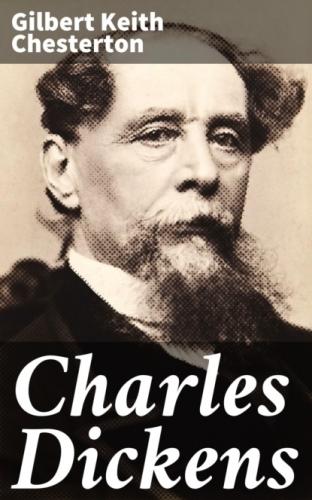In one way, however, the "Sketches by Boz" do stand out very symbolically in the life of Dickens. They constitute in a manner the dedication of him to his especial task; the sympathetic and yet exaggerated painting of the poorer middle-class. He was to make men feel that this dull middle-class was actually a kind of elf-land. But here, again, the work is rude and undeveloped; and this is shown in the fact that it is a great deal more exaggerative than it is sympathetic. We are not, of course, concerned with the kind of people who say that they wish that Dickens was more refined. If those people are ever refined it will be by fire. But there is in this earliest work, an element which almost vanished in the later ones, an element which is typical of the middle-classes in England, and which is in a more real sense to be called vulgar. I mean that in these little farces there is a trace m the author as well as in the characters, of that petty sense of social precedence, that hubbub of little unheard-of oligarchies, which is the only serious sin of bourgeoisie of Britain. It may seem pragmatical, for example, to instance such rowdy farce as the story of Horatio Sparkins, which tells how a tuft-hunting family entertained a rhetorical youth thinking he was a lord, and found he was a draper's assistant. No doubt they were very snobbish in thinking that a lord must be eloquent; but we cannot help feeling that Dickens is almost equally snobbish in feeling it so very funny that a draper's assistant should be eloquent. A free man, one would think, would despise the family quite as much if Horatio had been a peer. Here, and here only, there is just a touch of the vulgarity, of the only vulgarity of the world out of which Dickens came. For the only element of lowness that there really is in our populace is exactly that they are full of superiorities and very conscious of class. Shades, imperceptible to the eyes of others, but as hard and haughty as a Brahmin caste, separate one kind of charwoman from another kind of charwoman. Dickens was destined to show with inspired symbolism all the immense virtues of the democracy. He was to show them as the most humorous part of our civilisation; which they certainly are. He was to show them as the most promptly and practically compassionate part of our civilisation; which they certainly are. The democracy has a hundred exuberant good qualities; the democracy has only one outstanding sin -- it is not democratic.
Конец ознакомительного фрагмента.
Текст предоставлен ООО «ЛитРес».
Прочитайте эту книгу целиком, купив полную легальную версию на ЛитРес.
Безопасно оплатить книгу можно банковской картой Visa, MasterCard, Maestro, со счета мобильного телефона, с платежного терминала, в салоне МТС или Связной, через PayPal, WebMoney, Яндекс.Деньги, QIWI Кошелек, бонусными картами или другим удобным Вам способом.
